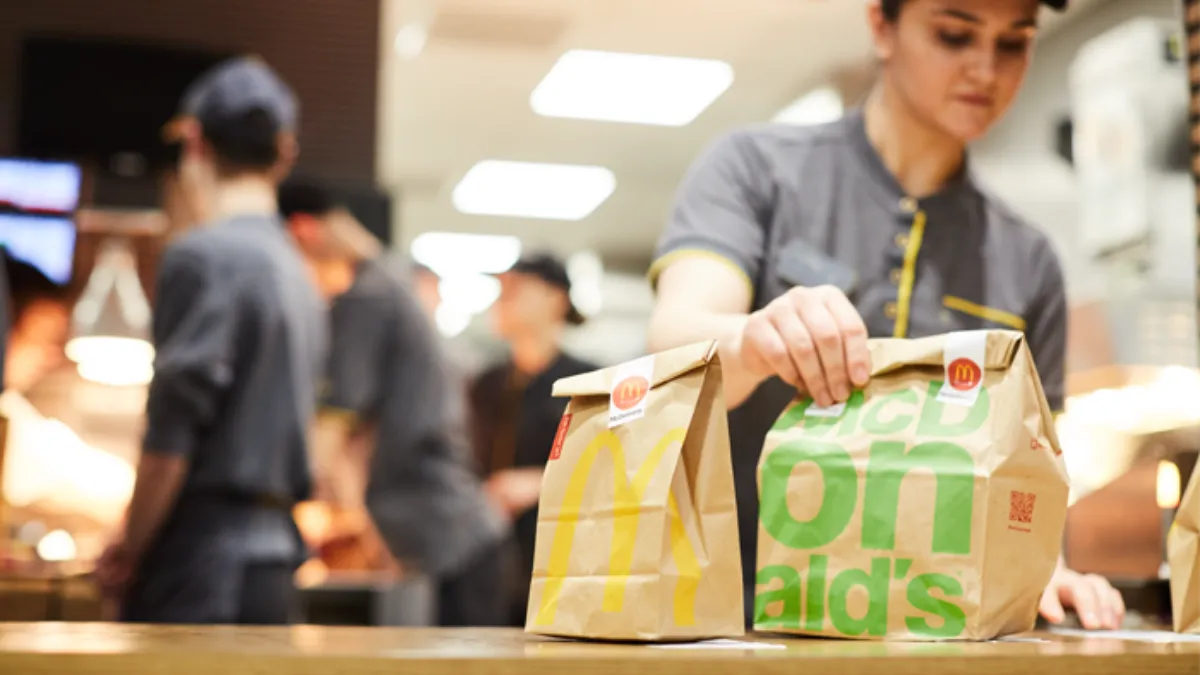Dive Brief:
- McDonald's franchisees are rolling out increased hourly pay, paid time off and tuition coverage to attract employees amid the labor crisis and bolster the brand's reputation, McDonald's said in an emailed statement. McDonald's will make a multimillion-dollar investment to support these operator initiatives, and some operators will also offer child and elderly care benefits this summer, The Wall Street Journal reports.
- The chain began reviewing pay and benefits offerings last year and surveyed more than 5,000 employees and 750 owner/operator organizations about what compensation changes would be most attractive. In June, the National Franchise Leadership Alliance officially endorsed the Employee Value Proposition to highlight their support of McDonald's workers, McDonald's said.
- Individual McDonald's operators have already made benefits changes — one Denver franchisee is shelling out more than $1 million on wage increases. Franchisees will evaluate how their wages compare to restaurant rivals in their markets this summer, and will also decide whether to expand the new emergency care benefits by the close of 2021, the publication said.
Dive Insight:
McDonald's efforts to fine-tune benefits at franchised locations could have a major impact on its system, as operators control about 95% of the burger giant's 13,450 U.S. restaurants.
Corporate already announced in May that it would hike wages at company-owned locations to between $11 and $17 an hour to compete with quick service restaurant rivals. But throwing millions of dollars behind pay bumps at franchised locations signals both support for its operators — who have long had a contentious relationship with corporate leadership — and acknowledgment of how dire the restaurant labor crisis has become.
Employee shortages are the second top concern for restaurant operators after rising food costs, according to a June report from Quadrant Strategies. After a year of pandemic-induced restaurant restrictions and cycles of layoffs and rehirings, many restaurant employees have left the sector for more stable jobs. The quit rate in the hotel and restaurant industry was at an all-time high of 5.6% in April, the highest of any sector. In April, the segment shed 681,000 jobs, or roughly 50% of new hires for the period, due to attrition.
The situation could worsen, too. One Fair Wage reported in May that 76% of restaurant workers are leaving their positions due to low wages and tips. McDonald's is better positioned than most restaurant chains to overcome this pressure because it does not operate on a tipped model and has deep pockets to cover increased wages without bruising its bottom line.
McDonald's CEO Chris Kempczinski said at the CNBC Evolve Global Summit last month that "there's no doubt that $7.25 in this day and age is not what you should be paying ... to be competitive in the marketplace." This sentiment builds on Kempczinski's statement in January that the chain is doing "just fine" in the 29 markets that have increased wage rates above the federal minimum wage of $7.25 per hour. A four-year analysis of McDonald's wages found that increased pay at some of the chain's stores haven't sparked closures or job loss, and haven't sped up automation.
McDonald's influence on the U.S. restaurant market will likely cause more restaurant chains in all segments, and eventually independent operators, to find ways to add more competitive pay and benefits to their balance sheets. Chipotle already committed to raising average hourly pay to $15 an hour by the end of June, and Olive Garden raised wages in March to at least $10 per hour including tipped income. The Darden brand also put $17 million toward one-time bonuses for hourly restaurant workers, though this move likely won't have the retention benefits of the policy changes McDonald's is rolling out.
McDonald's investment in employees could help stabilize its relationship with franchisee leadership. Earlier in the summer, corporate announced it is cutting technology fees it planned to charge U.S. operators by 62%, or about $42 million of the planned $68 million, after operator complaints.
"The National Franchise Leadership Alliance is proud to endorse this plan, which will help McDonald's and its franchisees remain employers of choice in today's increasingly competitive hiring environment," NFLA People Team Lead David Costa said in a statement.














